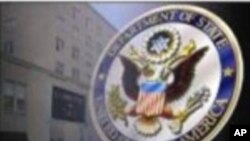Twenty countries are listed in the U.S. State Department's just-released annual report on major drug transit or major illicit drug producers. As a result of the report's findings, President George W. Bush has cited Burma and Venezuela as countries that have "failed demonstrably" during the past twelve months to enact counter narcotics-trafficking strategies. Others on the list are Afghanistan, the Bahamas, Bolivia, Brazil, Colombia, the Dominican Republic, Ecuador, Guatemala, Haiti, India, Jamaica, Laos, Mexico, Nigeria, Pakistan, Panama, Paraguay, and Peru.
Christy McCampbell is the U.S. Deputy Assistant Secretary of State for International Narcotics Affairs. Burma, she says, is a major producer of opium and a major trafficker of methamphetamine stimulates. "Burma's performance is also lackluster," says Ms. McCampbell, "in the areas of demand reduction, interdiction, anti-money laundering and combating corruption."
In the case of Venezuela, Ms. McCampbell says Venezuelan authorities have ended a number of programs. She says Venezuelans ended a narcotics prosecution task force and a cargo inspection facility. Under U.S. law, the designation of "demonstrable failure" in the cases of Burma and Venezuela, means that these countries can be found ineligible for U.S. aid, though humanitarian and counter trafficking assistance is usually continued.
Deputy Assistant Secretary of State Christy McCampbell says almost every country in the world "including the United States is having a terrible problem with drugs." The point, she says, "is that some countries don't seem to be too worried about it." She says we're trying "to work together and figure out how we can solve these problems.
Anncr: That was an editorial reflecting the views of the United States Government. If you have a comment, please write to Editorials, V-O-A, Washington, D-C, 20237, U-S-A. You may also comment -- and view all our current editorials -- at the V-O-A Editorials home page: www-dot-voanews-dot-com-slash-editorials.
<!-- IMAGE -->




